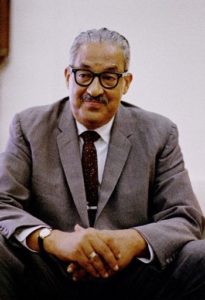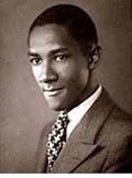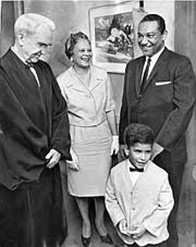Children with disabilities and their parents had limited rights and educational options prior to the creation of our current comprehensive special education laws in the mid-1970’s. At least one state imposed criminal penalties on parents who tried to enroll their children with special needs in public school. Even after Congress established basic rights and protections, state and local governments and school districts continued imposing disability-based and racist segregation, testing and housing practices. Learn about these African American jurists who advanced the rights—and changed the lives—of children with disabilities:

Hon. Thurgood Marshall: You likely know that, as an attorney, Thurgood Marshall was the lead architect of the famous Brown v. Board of Education (1954) decision that struck down race-based segregation in public schools. But did you know that 17 years later, lawyers representing parents of children with developmental disabilities copied the blueprint for Brown to strike down disability-based segregation? Applying Marshall’s equal protection and due process (fairness) arguments, parents in PARC v. Commonwealth of Pennsylvania (1971) overturned state laws and common school district practices that banned children with disabilities from public school and forced parents to pay for expensive private placements. The PARC case is one of two key decisions at the foundation of our current special education laws.
As a member of the Supreme Court, Justice Marshall continued to advance the rights of persons with disabilities. The City of Cleburne v. Cleburne Living Center (1985) case involved a Texas city that refused to allow a group home for persons with intellectual disabilities claiming it was a “hospital for the feebly minded.” Although the Court ruled that Cleburne’s disability-based ban was illegal, Justice Marshall wanted to go even further, demanding that any laws restricting the rights of persons with disabilities should always be closely examined. Marshall’s dissent, recounting the historic mistreatment of persons with disabilities, is a must-read.

Hon. Cecil Poole: This University of Michigan and Harvard Law grad was a legal powerhouse! In 1949, he became San Francisco’s first Black District Attorney. He was also the first African American U.S. Attorney for the Northern District of California and the first Black judge appointed to the U.S. District Court in San Francisco. With his lovely wife Charlotte, he led local chapters of the NAACP and National Urban League. Judge Poole was elevated to the 9th Circuit, our region’s highest appeals court, in 1979. Five years later, Judge Poole authored the Larry P. v. Riles (1984) opinion that changed the lives of African-American students with disabilities in California.
“Disproportionality” generally refers to the overrepresentation of minority students in special education and in certain classifications. The case of Larry P. v. Riles is an extreme example of this abuse where the California Department of Education allowed (and even facilitated) the wholesale labeling of young African American children as “educable mentally retarded” and condemned them to non-academic classes. Judge Poole upheld an order eliminating this practice and banned California’s Department of Education and its school districts and charter schools from IQ testing African American students and relegating them to sub-standard programs. Judge Poole’s legal ban on IQ-testing continues today, even though many school districts selectively ignore it.

Hon. Joseph C. Waddy: Judge Waddy was a fierce advocate for civil rights throughout his legal career. He was one of the top Black lawyers in Washington D.C. before he was appointed to the D.C. Superior Court and later the U.S. District Court. In 1972, Judge Waddy decided the Mills v. Board of Education, District of Columbia case. Prior to that case, the D.C. Public Schools arbitrarily labeled students with exceptional needs as “mentally retarded,” “emotionally disturbed,” or “hyperactive.” Those children with behavioral challenges were completely banned from public school with zero opportunity for any alternative educational placement or periodic review.
In his order banning D.C. Public Schools’ discriminatory policies, Judge Waddy declared that public education is “a right which must be made available to all on equal terms.” Like the judge in PARC, Judge Waddy equated disability-based segregation with that outlawed by the Supreme Court in Brown v. Board of Education. School districts must educate and train students with disabilities and could not claim lack of funds as an excuse. “Exceptional” children cannot be excluded from regular public school classes without due process of law (including a “due process” hearing and regular review of the child’s status, progress, and the adequacy of any educational placement). Judge Waddy’s decision in Mills, like PARC, formed the basis for our current special education laws.
Read, The Top 5 IEP Mistakes, and How to Avoid Them, for more information regarding the history and importance of special education laws.
In response to the COVID-19 crisis and school closures, ADAMS ESQ’s social justice circle is funding academic screenings at no charge to qualifying children with special education needs in California and Nevada. For more information on this program, contact us today at: together@adamsesq.com or reach us toll-free at: 1-800-785-6713. You also may want to read and repost our past COVID19-related blogs: “Forget About the Toilet Paper—Grab that IEP!”, “IEP Alerts for Parents” , “Special Education Teaching is Really Hard!”, “The ‘FREE’ in FAPE”, Doubling-Down on Special Education and Look Before You Leap! 5 Things to Know Before Leaving Your Child at School During a Pandemic.

